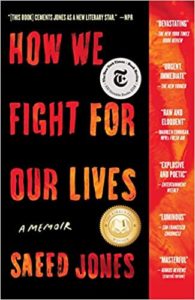How We Fight for Our Lives, by Saeed Jones
generous—freely sharing or giving; open-handed
You know it when you hear it, the difference in tone between the way a generous and a begrudging person speaks. Open-handedness is evident in the opening of the soft palate, each word making room.
Generosity is what I heard in listening to the audiobook of Saeed Jones’ How We Fight for Our Lives. Jones is a poet, and this book is his memoir. It won the Kirkus Prize and the Stonewall Book Award. I was afraid to read it, knowing some parts would be hard as he describes growing up gay and Black in a Texas town where I once lived.
But then I heard his voice. First on Sam Sanders’ podcast and then in a Texas Book Festival discussion. I bought the audio version of the book.

Memoir is hard to do well. How does a writer not just go from start to finish but select which scenes most matter? Which tell this story, not the seventeen other stories that could be told? Jones is masterful in his selectivity.
A good book—whether memoir or fiction or some version of nonfiction—makes me question myself and my version of my life. In How We Fight for Our Lives, it was Jones’ relationship with his grandmother that most affected me. There was love, but also hurt. How could a boy on the cusp of adolescence be generous toward a woman who prayed in public for God to bring every plague and hardship upon her own daughter? But reading his journey toward love made me reconsider some difficult family members in my own life.
After I finished Jones’ memoir, I looked up his poetry. In Daedalus, After Icarus, Jones imagines the man after his son’s fall. He is the object of ridicule, but he doesn’t seem to notice.
We don’t know his name or why he walks
along our beach, talking to the wind.
In the poem’s final two lines, something shifts for Daedalus. The mocking continues, but he has heard truth in the taunts. He “turns, and runs toward the water.” His way forward is not up but out into the deep. I picture the father’s hands, open, swimming.
December’s Pages
Poetry
Leavings, by Wendell Berry
Picture Books and Early Readers
Katy and the Big Snow, by Virginia Lee Burton (Join us for Children’s Book Club next Friday, January 15)
We Don’t Eat Our Classmates, by Ryan T. Higgins
The Happy Day, by Ruth Krauss, illus. Marc Simont
Grownups
The Furious Hours, by Casey Cep
The Big Sleep, by Raymond Chandler
Little Black Sheep, by Ashley Cleveland
How We Fight for Our Lives, by Saeed Jones
Made Progress
Frankenstein, by Mary Shelly (reread, but it’s been a while)
For Discussion
1. What memoirs have stuck with you?
2. What stories have helped you become more generous with someone?
3. Share your December pages. Sliced, started, and abandoned are all fair game.
Photo by saebaryo, Creative Commons, via Flickr. Post by Megan Willome.
Browse more reading roundups
“Megan Willome’s The Joy of Poetry is not a long book, but it took me longer to read than I expected, because I kept stopping to savor poems and passages, to make note of books mentioned, and to compare Willome’s journey into poetry to my own. The book is many things. An unpretentious, funny, and poignant memoir. A defense of poetry, a response to literature that has touched her life, and a manual on how to write poetry. It’s also the story of a daughter who loses her mother to cancer. The author links these things into a narrative much like that of a novel. I loved this book. As soon as I finished, I began reading it again.”
—David Lee Garrison, author of Playing Bach in the D. C. Metro
- Perspective: The Two, The Only: Calvin and Hobbes - December 16, 2022
- Children’s Book Club: A Very Haunted Christmas - December 9, 2022
- By Heart: ‘The night is darkening round me’ by Emily Brontë - December 2, 2022


Glynn says
For memoirs that have stuck with me, I have two by the same author – “The Oak and the Calf” and “Between Two Millstones, Vol. 1” by Aleksandr Solzhenitsyn. He’s one of those rare authors who wrote literary fiction and made history at the same time.
December reading
Mystery
The Beach Party Mystery by Peter Bartram
Force of Evil by Simon Michael
Dark Streets Shineth by Clare Revell
The Christmas Stalking by Lillian Duncan
Fiction
Understood Betsey by Dorothy Canfield Fisher
The Baker’s Daughter by D.P. Cornelius
So Much Better Your Way, Signed Jack by Theresa Laws
In the Wine Press: Short Stories by Joshua Hren
Non-fiction
Charles Dickens: A Very Short Introduction by Jenny Hartley
Drama
Smart People by Lydia Diamond
Christmas Novellas (I binged on them)
Redeeming Christmas by Carol James
Mary’s Christmas Surprise by Carol James
Penny’s Yuletide Wish by Sally Britton
Dr. Noah and the Sugar Plum Fairy by Carla Rossi
Timed Arrow by Clare Revell
Christmas with Miss Austen by Laura Briggs
The Present by Toni Sheridan
An Aussie Christmas Angel by Clare Revell
A Dad for Christmas by Wendy Davy
Mistletoe Melody by Stacey Weeks
A New Hope for Christmas by Erin Stevenson
Virtually Yours at Christmas by Clare Revell
Christmas Lights by Tanya Hanson
The Widow’s Christmas Miracle by Kathleen Bailey
A Cup of Christmas Kindness by LoRee Perry
Undercover Santa by Wendy Davy
Christmastime in London Town by Clare Revell
First Class Christmas by Katy Eeten
A Christmas Homecoming by Kimberly Rose Johnson
Mistletoe Movie Star by Wendy Davy
Deep Freeze Christmas by Marion Merritt
Holly Hearts by Tanya Hanson
My Secret Santa by Jaclyn Wiest
Midnight Clear by Autumn Macarthur
Meet Me Under the Mistletoe by JoAnn Durgin
Poetry
Featherdusting the Moon by Troy Cady
Megan Willome says
Wow, you did indeed binge. Hope the effect was holiday joy.
Thank you for bringing up Solzhenitsyn. I have not read him–have been a bit intimidated, to be honest, but you’re so correct that he holds a unique place where literature and history meet.
L.L. Barkat says
It’s so interesting how we can perceive a voice as generous or not. I wonder what it is that we are hearing that makes it so. (I also wonder… is it possible to have a voice that doesn’t sound generous while, in actuality, we can be a generous person and vice versa?)
I’ve been skip reading a lot of books lately. Really enjoying The Reindeer Chronicles, The Nightfields (poems by Joanna Klink), and The Soil Will Save Us.
What was one of your favorite lines or passages from Jones’ book?
Megan Willome says
I am sure I have misjudged voices, but not often.
My favorite chapters were the short ones, where a small thing illustrates a big thing. I also love the ending, in Spain: “Our mothers are why we’re here.”
Bethany R. says
Hm, interesting thought about how we perceive a voice as generous or not. I think I have even found over time that my perception can evolve. A particular voice/conversation may be generative in one season when it was not in another, or vice versa.
Megan Willome says
Very insightful, Bethany.
Bethany R. says
Intrigued by this: “It took years of Jones learning to be generous toward his own failings.” Thanks for sharing this post. 🙂
Megan D. Willome says
Bethany, many parts of the book are hard, but i am glad I read it. The question of how we deal with our own failings when others have failed us intrigued me.
Bethany R. says
Yes, lots to think about there.
Will Willingham says
I’ve followed Jones’ work for a long time and, for reasons that are still not completely clear to me given how vastly different our experiences have been, have always felt a certain connection to it. His poetry collection in particular has stayed and stayed with me. I found his memoir both exquisite and excruciating, in a way that probably only he could accomplish. It sits on a small shelf in my living room along with a few other select titles, select in part because of the color of the cover, and in part because of my attachment to the books themselves. Jones, Gelman, Neruda, Cohen and one other.
Megan Willome says
”Exquisite and excruciating” is a very good description. I want to read more of Jones’ poetry. So glad to know this book has a special place on your shelf.